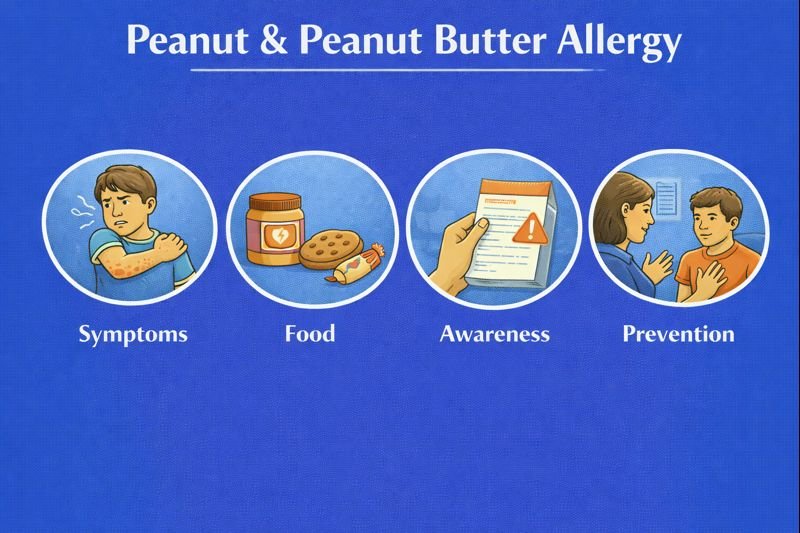Peanut & Peanut Butter Allergy: Symptoms, Triggers & Awareness

Relevance in Canada, Food Safety & Daily Life
Food allergies are relevant in schools, workplaces, restaurants, sports, and travel. Canadian families often encounter peanuts in packaged foods, shared snacks, and baking. Food allergy awareness helps peers and adults support safe environments.
Scenario (Mild & Realistic)
At lunch, a student noticed a snack label listed peanuts and chose a different food. Their friend mentioned having a peanut allergy and appreciated that ingredients were checked first.
What Causes Peanut Allergy?
Food allergies involve the immune system reacting to a protein in food as if it were harmful. In peanut allergy, immune responses may involve antibodies that trigger symptoms in areas such as the skin, breathing passages, or digestive tract.
Symptoms of Peanut Allergy
Skin & Eyes
-
Itchy skin
-
Hives or welts
-
Redness or warmth
-
Itchy or watery eyes
Breathing & Nose
Some symptoms resemble those of asthma or seasonal allergies, including:
-
Coughing
-
Wheezing
-
Sneezing
-
Runny or itchy nose
-
Sensation of tightness in the throat
Digestive System
Food allergies can also affect digestion, including:
-
Nausea
-
Vomiting
-
Cramping
-
Diarrhea
-
Itchiness or redness around the mouth
Severe Allergic Reactions (Anaphylaxis)
A small number of individuals with peanut allergy may experience anaphylaxis, a severe allergic reaction involving multiple body systems. Symptoms can include:
-
Difficulty breathing
-
Dizziness or faintness
-
Rapid changes in pulse
-
Sudden drop in blood pressure
-
Widespread hives or swelling
Anaphylaxis is considered a medical emergency and requires rapid intervention from trained responders.
Food Exposure & Label Awareness
Peanut ingredients can be found in:
-
Peanut butter
-
Baked goods (cookies, pastries, bars)
-
Ice cream and desserts
-
Chocolates and candies
-
Sauces and international cuisine
-
Snacks with shared equipment (manufacturing cross-contact)
Food packaging in Canada includes allergen labelling for peanuts, which supports safer food decisions for families, schools, and workplaces.
Prevention & Daily Strategies
Common strategies involve:
-
Reading food labels
-
Asking about ingredients when eating out
-
Avoiding foods with unclear contents
-
Planning for school and social events
Families, schools, activity groups, and workplaces often collaborate on food allergy awareness to support inclusive environments.
FAQ
Is peanut butter allergy the same as peanut allergy?
Yes. Peanut butter contains peanut protein, which is the trigger for allergic reactions.
Do all peanut reactions look the same?
No. Reactions vary widely by person and by exposure amount.
Can allergy severity change over time?
In some individuals severity can lessen or persist; patterns are determined by health professionals.
Are peanut allergies common in children?
Yes. Many allergies are identified in childhood, and some persist into adulthood.
Educational Note
This article provides public and youth-friendly education on peanut allergy awareness. Allergic responses vary greatly among individuals, and health professionals guide diagnosis, treatment, and emergency planning for those with food allergies.
